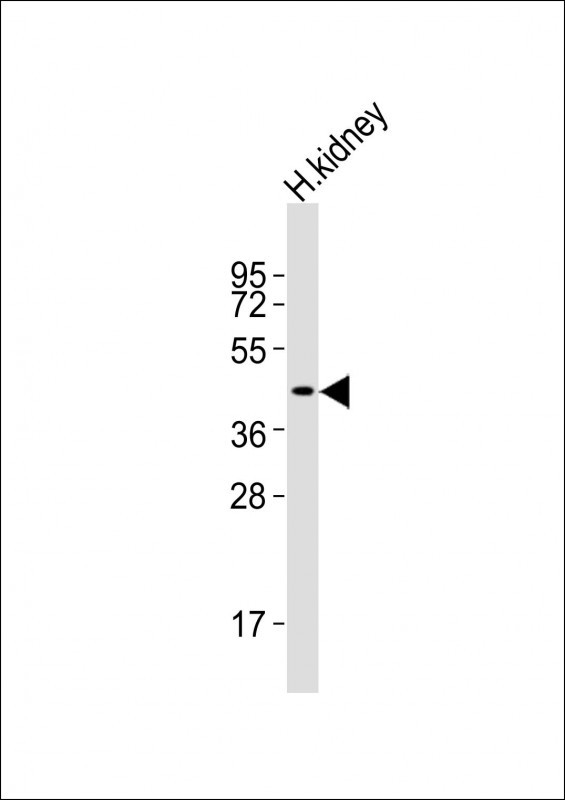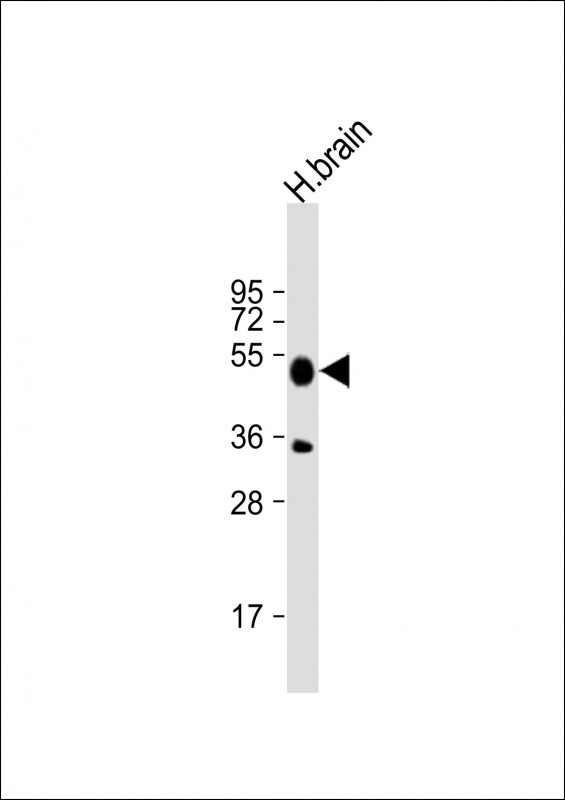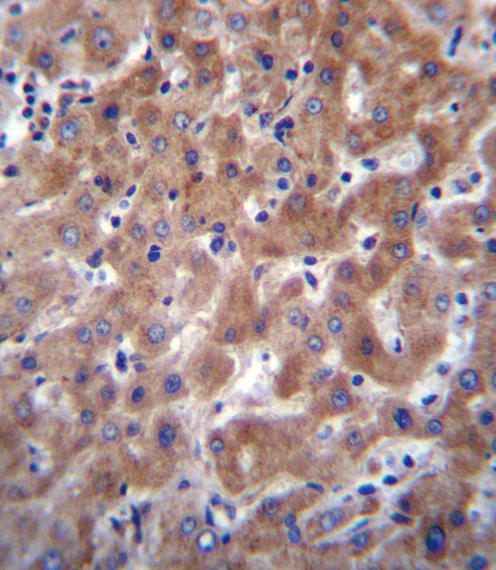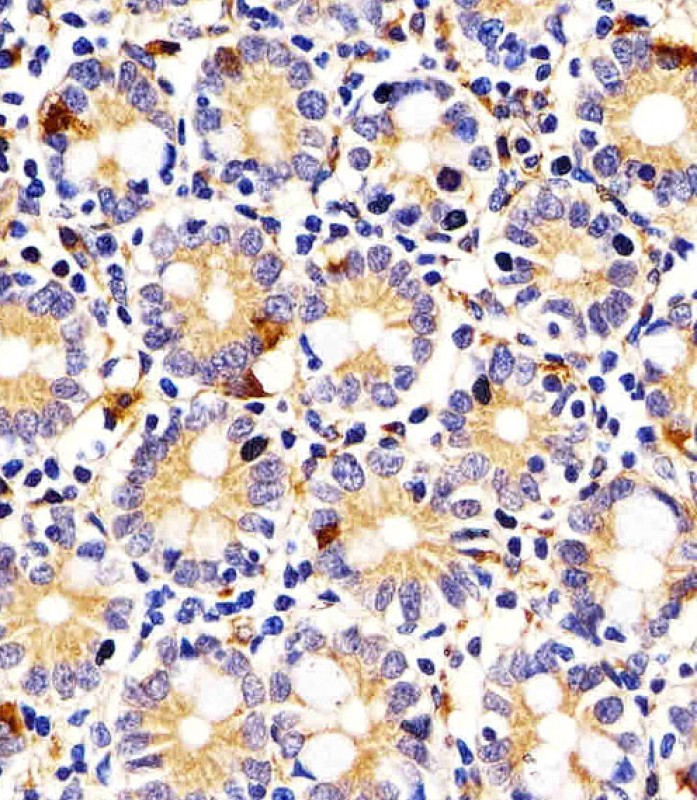I23O2 Antibody (C-term)
Affinity Purified Rabbit Polyclonal Antibody (Pab)
- SPECIFICATION
- CITATIONS
- PROTOCOLS
- BACKGROUND

Application
| WB, IHC-P, E |
|---|---|
| Primary Accession | Q6ZQW0 |
| Other Accession | NP_919270.2 |
| Reactivity | Human |
| Host | Rabbit |
| Clonality | Polyclonal |
| Isotype | Rabbit IgG |
| Calculated MW | 45424 Da |
| Antigen Region | 267-295 aa |
| Gene ID | 169355 |
|---|---|
| Other Names | Indoleamine 2, 3-dioxygenase 2, IDO-2, 11311-, Indoleamine 2, 3-dioxygenase-like protein 1, Indoleamine-pyrrole 2, 3-dioxygenase-like protein 1, IDO2, INDOL1 |
| Target/Specificity | This I23O2 antibody is generated from rabbits immunized with a KLH conjugated synthetic peptide between 267-295 amino acids from the C-terminal region of human I23O2. |
| Dilution | WB~~1:4000 IHC-P~~1:25 E~~Use at an assay dependent concentration. |
| Format | Purified polyclonal antibody supplied in PBS with 0.09% (W/V) sodium azide. This antibody is purified through a protein A column, followed by peptide affinity purification. |
| Storage | Maintain refrigerated at 2-8°C for up to 2 weeks. For long term storage store at -20°C in small aliquots to prevent freeze-thaw cycles. |
| Precautions | I23O2 Antibody (C-term) is for research use only and not for use in diagnostic or therapeutic procedures. |
| Name | IDO2 (HGNC:27269) |
|---|---|
| Function | Catalyzes the first and rate limiting step of the catabolism of the essential amino acid tryptophan along the kynurenine pathway (PubMed:17671174). Involved in immune regulation. May not play a significant role in tryptophan-related tumoral resistance (PubMed:25691885). |
| Tissue Location | Detected in liver, small intestine, spleen, placenta, thymus, lung, brain, kidney, and colon (PubMed:17671174) Also expressed at low level in testis and thyroid. Not expressed in the majority of human tumor samples (>99%) (PubMed:25691885) |

Thousands of laboratories across the world have published research that depended on the performance of antibodies from Abcepta to advance their research. Check out links to articles that cite our products in major peer-reviewed journals, organized by research category.
info@abcepta.com, and receive a free "I Love Antibodies" mug.
Provided below are standard protocols that you may find useful for product applications.
Background
Along with the enzymes encoded by the INDO (MIM 147435) and TDO2 (MIM 191070) genes, the enzyme encoded by the INDOL1 gene metabolizes tryptophan in the kynurenine pathway (Ball et al., 2007 [PubMed 17499941]).
References
Cetindere, T., et al. Cell. Signal. 22(2):197-211(2010)
Huttunen, R., et al. Shock 33(2):149-154(2010)
Witkiewicz, A.K., et al. J. Am. Coll. Surg. 208(5):781-787(2009)
Metz, R., et al. Cancer Res. 67(15):7082-7087(2007)
Ball, H.J., et al. Gene 396(1):203-213(2007)
If you have used an Abcepta product and would like to share how it has performed, please click on the "Submit Review" button and provide the requested information. Our staff will examine and post your review and contact you if needed.
If you have any additional inquiries please email technical services at tech@abcepta.com.













 Foundational characteristics of cancer include proliferation, angiogenesis, migration, evasion of apoptosis, and cellular immortality. Find key markers for these cellular processes and antibodies to detect them.
Foundational characteristics of cancer include proliferation, angiogenesis, migration, evasion of apoptosis, and cellular immortality. Find key markers for these cellular processes and antibodies to detect them. The SUMOplot™ Analysis Program predicts and scores sumoylation sites in your protein. SUMOylation is a post-translational modification involved in various cellular processes, such as nuclear-cytosolic transport, transcriptional regulation, apoptosis, protein stability, response to stress, and progression through the cell cycle.
The SUMOplot™ Analysis Program predicts and scores sumoylation sites in your protein. SUMOylation is a post-translational modification involved in various cellular processes, such as nuclear-cytosolic transport, transcriptional regulation, apoptosis, protein stability, response to stress, and progression through the cell cycle. The Autophagy Receptor Motif Plotter predicts and scores autophagy receptor binding sites in your protein. Identifying proteins connected to this pathway is critical to understanding the role of autophagy in physiological as well as pathological processes such as development, differentiation, neurodegenerative diseases, stress, infection, and cancer.
The Autophagy Receptor Motif Plotter predicts and scores autophagy receptor binding sites in your protein. Identifying proteins connected to this pathway is critical to understanding the role of autophagy in physiological as well as pathological processes such as development, differentiation, neurodegenerative diseases, stress, infection, and cancer.






